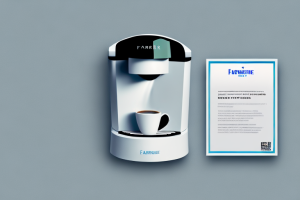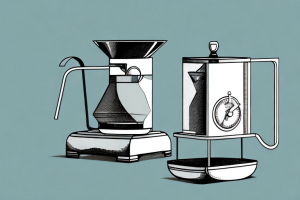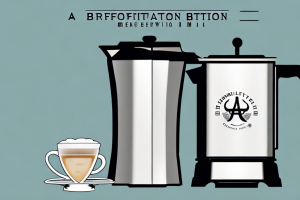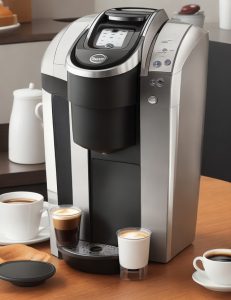Cleaning Coffee Maker With Baking Soda

A coffee maker with a box of baking soda beside it
For many people, coffee is the lifeblood that helps them power through the day. But even the most dedicated coffee lover may forget to clean their coffee maker. Over time, coffee residue and oil can build up in the machine, affecting the taste of your morning cup of joe. This is where baking soda can come in handy. In this article, we will discuss everything you need to know about cleaning your coffee maker with baking soda.
Why Clean Your Coffee Maker with Baking Soda?
The most obvious reason to clean your coffee maker is to improve the flavor of your coffee. When coffee oils build up in the machine, they can impart a bitter taste to the brew. But there are other benefits as well. A clean coffee maker is less likely to harbor bacteria that can make you sick. Plus, regular cleaning will extend the life of your machine, which will save you money in the long run.
Using baking soda to clean your coffee maker is a natural and effective way to remove stubborn stains and buildup. Baking soda is a gentle abrasive that can scrub away coffee stains without damaging the machine. It also helps to neutralize any odors that may be lingering in the coffee maker. Simply mix baking soda with water to create a paste, and use it to clean the carafe, filter basket, and other parts of the machine. Your coffee maker will be sparkling clean and ready to brew a delicious cup of coffee.
The Benefits of Using Baking Soda for Cleaning
Baking soda is a natural and inexpensive cleaning agent that can be found in most kitchens. It is a mild abrasive that can scrub away coffee stains and residue without damaging the machine. Baking soda is also a deodorizer, which means that it can help eliminate any funky odors that may be lingering in your coffee maker.
In addition to being a great cleaning agent for coffee makers, baking soda can also be used to clean other household items. For example, it can be used to clean and deodorize carpets, remove stains from clothing, and even clean bathroom tiles. Its versatility makes it a must-have in any cleaning arsenal.
Another benefit of using baking soda for cleaning is that it is environmentally friendly. Unlike many commercial cleaning products, baking soda is non-toxic and does not release harmful chemicals into the air. This makes it a safe and sustainable option for those who are conscious about the impact of their cleaning products on the environment.
How Often Should You Clean Your Coffee Maker?
It is recommended that you clean your coffee maker at least once a month. However, if you are a heavy coffee drinker or you use your machine multiple times a day, you may need to clean it more frequently. Keep an eye out for signs of buildup, such as a slower brew time or a change in the taste of your coffee.
Another factor to consider when determining how often to clean your coffee maker is the type of water you use. If you have hard water, which contains high levels of minerals, you may need to clean your machine more frequently. The minerals in hard water can build up in your coffee maker and affect the taste of your coffee.
When cleaning your coffee maker, it is important to use the right cleaning solution. Avoid using harsh chemicals or bleach, as these can damage your machine. Instead, use a mixture of equal parts water and vinegar to clean the inside of your coffee maker. Run the solution through the machine as if you were brewing a pot of coffee, then run several cycles of plain water to rinse out any remaining vinegar.
Step-by-Step Guide to Cleaning Your Coffee Maker with Baking Soda
Here is a step-by-step guide to cleaning your coffee maker with baking soda:
- Empty the carafe and remove the filter basket.
- Mix together 1/4 cup of baking soda and 1 quart of warm water.
- Pour the baking soda solution into the water chamber of your coffee maker.
- Turn on the machine and let it run through a brewing cycle.
- Once the cycle is complete, turn off the machine and let it sit for about 15 minutes. This will allow the baking soda solution to work its magic.
- After 15 minutes, turn the machine back on and run another brewing cycle, this time using just water to rinse everything out.
- Repeat the rinsing process one or two more times to ensure that all of the baking soda residue has been removed.
It is important to note that regular cleaning of your coffee maker can help to improve the taste of your coffee and extend the life of your machine. In addition to using baking soda, you can also clean your coffee maker with vinegar or specialized cleaning solutions. It is recommended to clean your coffee maker at least once a month to keep it in top condition.
What You Need to Clean Your Coffee Maker with Baking Soda
You will need the following supplies to clean your coffee maker with baking soda:
- Baking soda
- Warm water
- A clean, damp cloth
Before you begin cleaning your coffee maker with baking soda, it is important to unplug the machine and let it cool down completely. This will prevent any accidents or injuries from occurring during the cleaning process.
Additionally, it is recommended to clean your coffee maker with baking soda once a month to ensure that it is functioning properly and to prevent any buildup of mineral deposits or bacteria.
Tips for Effectively Cleaning Your Coffee Maker with Baking Soda
Here are a few tips to keep in mind when cleaning your coffee maker with baking soda:
- Make sure to read the manufacturer’s instructions before cleaning your specific model of coffee maker.
- Always unplug your coffee maker before cleaning it.
- Remove the carafe and filter basket before cleaning.
- After cleaning, rinse the carafe and filter basket thoroughly with water.
- Let your coffee maker dry completely before using it again.
It is recommended to clean your coffee maker with baking soda once a month to keep it functioning properly. Over time, mineral deposits and coffee oils can build up in your coffee maker, affecting the taste of your coffee. Baking soda is a natural and effective way to remove these buildups and keep your coffee maker clean.
Other Natural Cleaning Methods for Your Coffee Maker
If you don’t have baking soda on hand, there are other natural cleaning methods that you can use to clean your coffee maker. For example, you can use vinegar or lemon juice to remove buildup and eliminate odors.
Another natural cleaning method for your coffee maker is using citric acid. Citric acid is a weak organic acid that is found in citrus fruits and is commonly used as a natural cleaning agent. To use citric acid to clean your coffee maker, mix one tablespoon of citric acid with one cup of water and run the mixture through your coffee maker. Repeat the process with plain water to rinse out any remaining citric acid.
How to Prevent Buildup in Your Coffee Maker
The best way to prevent buildup in your coffee maker is to clean it regularly. In addition, be sure to use high-quality coffee and change your filter regularly. If you notice that your water is particularly hard, you may want to invest in a water softener to reduce mineral buildup.
Another way to prevent buildup in your coffee maker is to avoid leaving coffee sitting in the carafe for extended periods of time. When coffee sits for too long, it can create a residue that can be difficult to remove. Instead, try to brew only what you will drink in the moment, or transfer any leftover coffee to a thermal carafe to keep it fresh for longer.
Signs That It’s Time to Clean Your Coffee Maker
Here are a few signs that it may be time to clean your coffee maker:
- Your coffee takes longer to brew than usual.
- Your coffee has an off taste or smell.
- Your coffee looks darker than usual.
- You notice any buildup or residue inside the machine.
It’s important to note that cleaning your coffee maker regularly not only ensures a better tasting cup of coffee, but it also helps to prevent the growth of bacteria and mold. Neglecting to clean your coffee maker can lead to health risks and even damage to the machine itself. To keep your coffee maker in top condition, it’s recommended to clean it at least once a month using a mixture of water and vinegar or a specialized cleaning solution.
Common Mistakes to Avoid When Cleaning Your Coffee Maker
Here are a few common mistakes to avoid when cleaning your coffee maker:
- Using harsh chemicals that can damage the machine.
- Forgetting to rinse the carafe and filter basket thoroughly.
- Not letting the machine dry completely before using it.
- Not cleaning the machine frequently enough.
By following these tips and using baking soda to clean your coffee maker, you can ensure that your coffee tastes delicious and your machine lasts for years to come.
It is important to note that not all coffee makers are created equal and may require different cleaning methods. For example, some machines may have removable parts that can be washed in the dishwasher, while others may require hand washing. It is important to refer to the manufacturer’s instructions for specific cleaning guidelines.



